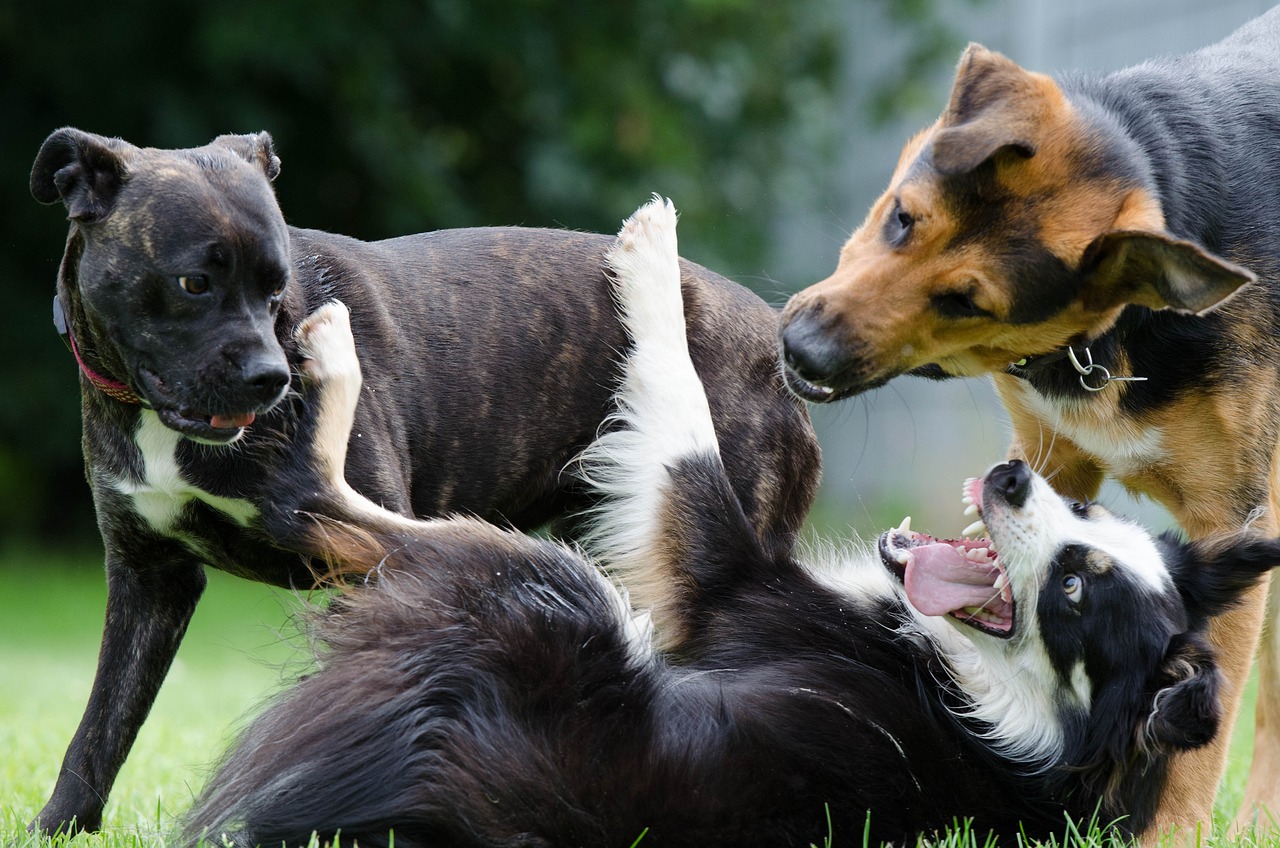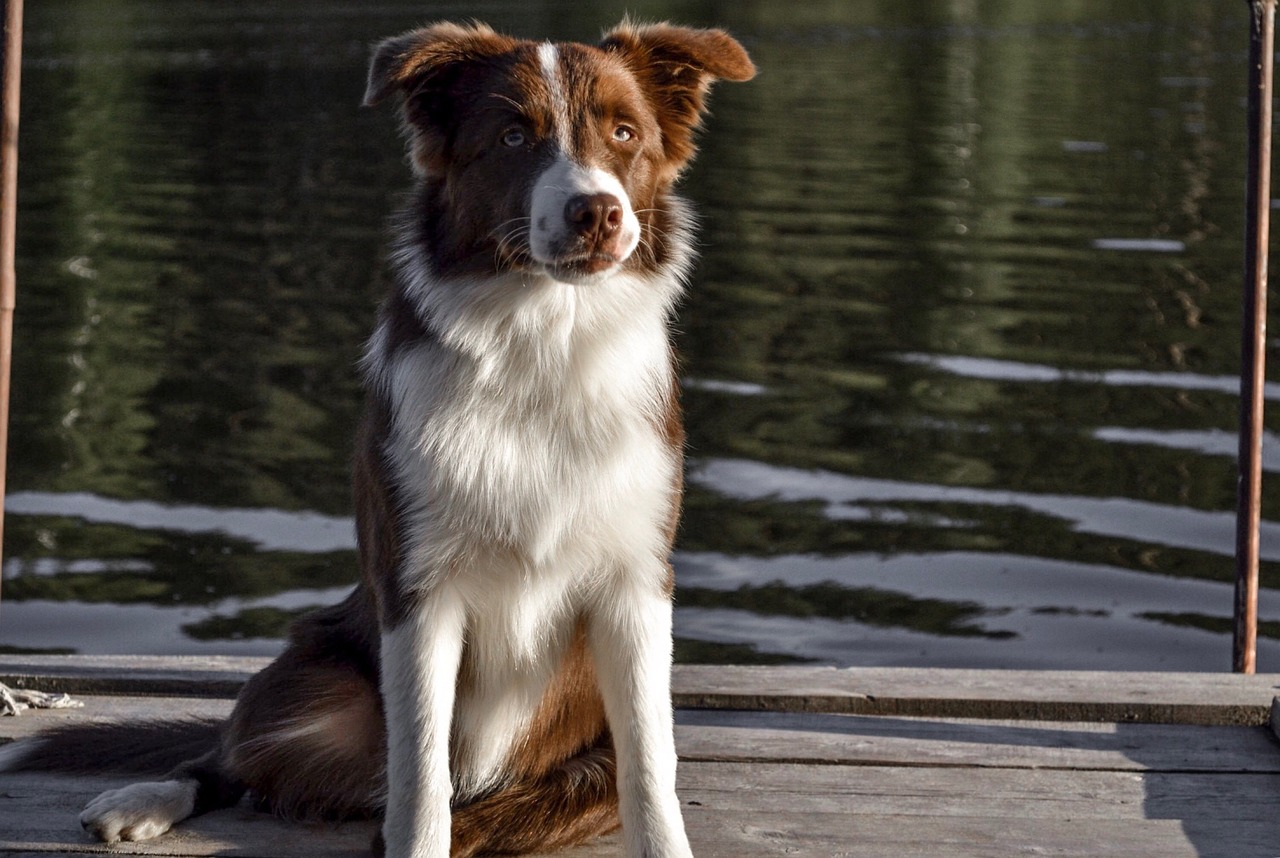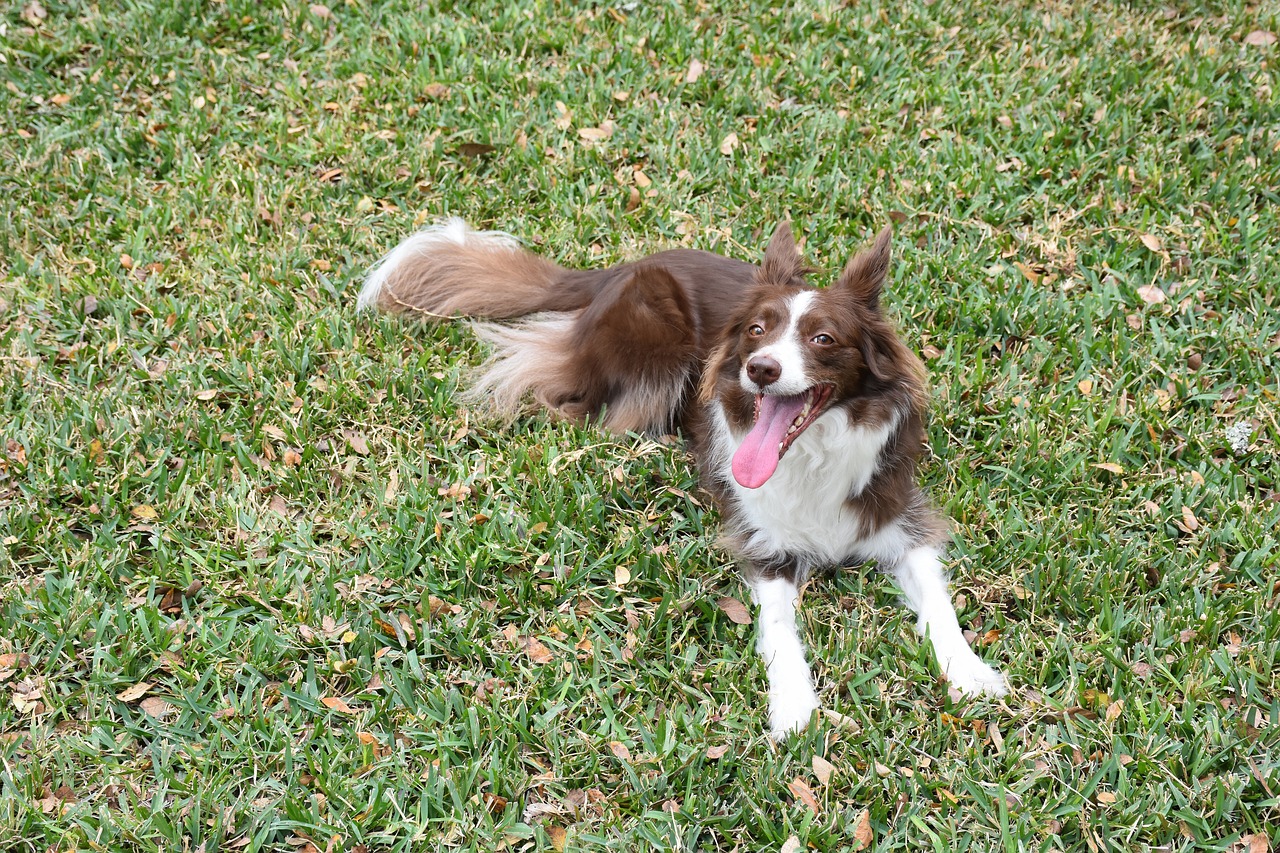The Energetic Spirit of Border Collies
Border Collies are not just dogs; they are a whirlwind of energy and intelligence wrapped in a fluffy coat. If you've ever seen one in action, you know they have a unique way of captivating everyone around them. With their bright eyes and agile bodies, they embody a spirit that is both playful and dedicated. These dogs were originally bred for herding sheep, which explains their natural instincts and boundless energy. But what really sets them apart is their vibrant personality that makes them one of the most beloved breeds in the canine world.
When you think about Border Collies, think of a dynamic duo of loyalty and playfulness. They are incredibly attached to their families and thrive on social interaction. Whether it’s a game of fetch in the yard or a romp in the park, they are always ready to engage in fun activities. Their herding instincts not only influence their behavior but also make them exceptional problem solvers. It’s almost as if they have a sixth sense for what’s happening around them, which allows them to respond to commands with remarkable speed and accuracy.
However, owning a Border Collie is not just about enjoying their adorable antics. It comes with a responsibility to cater to their physical and mental needs. These dogs are like high-performance athletes who require more than just a short walk around the block. They need structured activities that challenge their minds and bodies. Without proper stimulation, they can become bored and exhibit undesirable behaviors. So, if you’re considering welcoming a Border Collie into your home, be prepared for a lively companion who will keep you on your toes!
In the following sections, we will dive deeper into the personality traits that define these incredible dogs, their physical activity requirements, effective training techniques, and essential health care tips. Whether you’re a seasoned Border Collie owner or just curious about this energetic breed, there’s plenty to learn about how to ensure they thrive in a loving environment.
Border Collies are known for their energetic and intelligent nature. This section delves into their personality traits, including loyalty, playfulness, and their strong herding instincts that shape their behavior.
Due to their high energy levels, Border Collies require ample physical activity. This section discusses the importance of exercise routines and activities that keep them mentally and physically stimulated.
Creating a structured exercise routine is crucial for Border Collies. Here, we outline various activities such as agility training, fetch, and long walks to keep them engaged and healthy.
Agility training is an excellent way to channel a Border Collie’s energy. This subsection highlights the benefits of agility courses for both physical fitness and mental stimulation.
Socialization is key for Border Collies. This part discusses how playdates and interactions with other dogs enhance their social skills and reduce behavioral issues.
Recognizing the signs of an under-exercised Border Collie is essential. This section explains behavioral changes, such as excessive barking or destructive tendencies, that indicate a need for more activity.
Training a Border Collie requires patience and consistency. This section covers effective training methods that leverage their intelligence and eagerness to learn new commands.
Using positive reinforcement is vital in training Border Collies. This part discusses techniques such as treats and praise that encourage good behavior and strengthen the bond between owner and dog.
This section focuses on common behavioral issues in Border Collies, such as herding tendencies and separation anxiety, and offers solutions to address these challenges effectively.
Proper nutrition and healthcare are essential for maintaining a Border Collie’s energy levels and overall well-being. This section provides insights into dietary needs and regular vet check-ups.
Selecting a balanced diet is crucial for Border Collies. This subsection explains the nutritional requirements and how to choose quality dog food that supports their active lifestyle.
Regular veterinary visits are important for prevention and early detection of health issues. This part emphasizes the significance of routine check-ups and vaccinations for Border Collies.
- How much exercise does a Border Collie need daily? Border Collies typically require at least 1-2 hours of exercise each day to stay happy and healthy.
- Are Border Collies good family pets? Yes, they are known for their loyalty and affectionate nature, making them great companions for families.
- What are common health issues in Border Collies? Some common health issues include hip dysplasia, epilepsy, and eye problems.
- Can Border Collies live in apartments? While they can adapt to apartment living, they will need plenty of exercise and mental stimulation to thrive.

Understanding Border Collie Temperament
This article explores the vibrant personality traits, intelligence, and physical demands of Border Collies, along with tips on training and care to ensure they thrive in a loving environment.
Border Collies are often celebrated for their energetic and intelligent nature, making them one of the most beloved dog breeds around the world. Their temperament is a fascinating blend of loyalty, playfulness, and an innate instinct to herd. Imagine a dog that is not only your pet but also your best friend, always eager to please and ready for an adventure. This vibrant personality is what sets Border Collies apart from other breeds.
One of the most striking traits of a Border Collie is their loyalty. They form deep bonds with their humans, often following them around the house or wanting to be involved in every activity. This loyalty can sometimes border on clinginess, as they thrive on companionship and can become anxious if left alone for extended periods. Their playful nature means they are always up for a game, whether it’s a simple game of fetch or a more complex challenge involving agility equipment.
Another defining characteristic of Border Collies is their herding instinct. This instinct is not just a relic of their past as working dogs; it profoundly affects their behavior. Their natural urge to herd can manifest in various ways, such as trying to herd children, other pets, or even inanimate objects. Understanding this behavior is crucial for owners, as it can lead to both amusing antics and potential behavioral issues if not properly managed.
In addition to their loyalty and herding instincts, Border Collies are incredibly intelligent. They are often considered one of the smartest dog breeds, capable of learning new commands and tricks with remarkable speed. This intelligence makes them highly trainable, but it also means they require constant mental stimulation to keep them satisfied. A bored Border Collie is not a happy one; they can develop destructive behaviors if their minds and bodies are not adequately engaged.
To summarize, the temperament of a Border Collie can be encapsulated in the following key traits:
- Loyalty: Deep bonds with their owners.
- Playfulness: Always ready for fun and games.
- Herding Instinct: Natural tendency to herd people and objects.
- Intelligence: Quick learners who thrive on mental challenges.
Understanding these traits is essential for anyone considering bringing a Border Collie into their home. They are not just pets; they are active, vibrant companions who require commitment, engagement, and love. By recognizing their unique temperament, you can provide an environment where they can thrive and flourish, ensuring a harmonious relationship between you and your furry friend.
Due to their high energy levels, Border Collies require ample physical activity. This section discusses the importance of exercise routines and activities that keep them mentally and physically stimulated.
Creating a structured exercise routine is crucial for Border Collies. Here, we outline various activities such as agility training, fetch, and long walks to keep them engaged and healthy.
Agility training is an excellent way to channel a Border Collie’s energy. This subsection highlights the benefits of agility courses for both physical fitness and mental stimulation.
Socialization is key for Border Collies. This part discusses how playdates and interactions with other dogs enhance their social skills and reduce behavioral issues.
Recognizing the signs of an under-exercised Border Collie is essential. This section explains behavioral changes, such as excessive barking or destructive tendencies, that indicate a need for more activity.
Training a Border Collie requires patience and consistency. This section covers effective training methods that leverage their intelligence and eagerness to learn new commands.
Using positive reinforcement is vital in training Border Collies. This part discusses techniques such as treats and praise that encourage good behavior and strengthen the bond between owner and dog.
This section focuses on common behavioral issues in Border Collies, such as herding tendencies and separation anxiety, and offers solutions to address these challenges effectively.
Proper nutrition and healthcare are essential for maintaining a Border Collie’s energy levels and overall well-being. This section provides insights into dietary needs and regular vet check-ups.
Selecting a balanced diet is crucial for Border Collies. This subsection explains the nutritional requirements and how to choose quality dog food that supports their active lifestyle.
Regular veterinary visits are important for prevention and early detection of health issues. This part emphasizes the significance of routine check-ups and vaccinations for Border Collies.
1. How much exercise does a Border Collie need?
A Border Collie typically requires at least 1-2 hours of vigorous exercise daily to stay healthy and happy.
2. Are Border Collies good family pets?
Yes, they can be excellent family pets, especially in active households where they can engage with children and other pets.
3. Do Border Collies shed a lot?
Border Collies do shed, especially during seasonal changes, so regular grooming is recommended to manage their coat.
4. Can Border Collies live in apartments?
While they can adapt to apartment living, it’s essential to provide them with ample exercise and mental stimulation to prevent boredom.

Physical Activity Requirements
Border Collies are not just any breed; they are a whirlwind of energy wrapped in a furry package! These dogs were bred for herding, which means they have an innate need to stay active and engaged. If you’re considering bringing a Border Collie into your home, be prepared to embrace a lifestyle that includes plenty of physical activity. Think of it this way: a bored Border Collie is like a child stuck inside on a rainy day—restless, mischievous, and prone to getting into trouble!
The key to a happy and healthy Border Collie lies in meeting their physical activity requirements. On average, these energetic pups need at least 1 to 2 hours of exercise each day. This can include a mixture of structured activities and free playtime. Whether it's a brisk walk, a game of fetch, or an exciting agility course, keeping them active not only satisfies their physical needs but also helps prevent behavioral issues that arise from boredom.
To ensure that your Border Collie is getting the right amount of exercise, consider the following activities:
- Agility Training: This is a fantastic way to combine physical exercise with mental stimulation. Setting up an agility course in your backyard can challenge your dog's problem-solving skills while keeping them fit.
- Fetch: A classic game of fetch can be incredibly rewarding for both you and your dog. Throwing a ball or frisbee allows them to run freely and burn off excess energy.
- Long Walks or Hikes: Exploring new trails or parks not only provides physical exercise but also exposes your Border Collie to different sights and smells, enriching their environment.
While these activities are essential, it's crucial to tailor the exercise routine to your dog’s age, health, and energy levels. Puppy Border Collies will have bursts of energy that require shorter, more frequent play sessions, while older dogs may need a more relaxed pace. Always pay attention to your dog’s body language—if they seem tired or reluctant, it might be time to take a break.
Creating a structured exercise routine is vital for Border Collies. A well-rounded routine not only keeps them physically fit but also mentally sharp. Here’s a sample weekly exercise schedule:
| Day | Activity | Duration |
|---|---|---|
| Monday | Agility Training | 1 hour |
| Tuesday | Fetch at the park | 1 hour |
| Wednesday | Long Walk | 1.5 hours |
| Thursday | Playdate with other dogs | 1 hour |
| Friday | Swimming (if available) | 1 hour |
| Saturday | Hiking | 2 hours |
| Sunday | Rest and Recovery | N/A |
Incorporating variety into their exercise routine is essential for keeping your Border Collie interested and engaged. Just like humans, dogs can get bored with the same old activities day in and day out. Mixing things up will not only keep their spirits high but also provide different physical challenges that benefit their overall health.
Recognizing the signs of an under-exercised Border Collie is crucial for maintaining their well-being. If your dog is becoming increasingly restless, barking excessively, or displaying destructive behaviors, it might be time to reassess their exercise routine. Remember, a tired dog is a happy dog! By ensuring they get enough physical activity, you’ll not only enhance their quality of life but also strengthen the bond you share.
Q: How much exercise does a Border Collie need daily?
A: Border Collies typically require 1 to 2 hours of exercise each day to stay happy and healthy.
Q: Can I keep a Border Collie in a small apartment?
A: While it's possible, it requires a strong commitment to providing ample exercise and mental stimulation through regular walks and playtime.
Q: What are some good activities for Border Collies?
A: Activities like agility training, fetch, long walks, and social playdates with other dogs are excellent for keeping Border Collies active.
Ideal Exercise Routines
When it comes to keeping a Border Collie happy and healthy, a well-structured exercise routine is not just beneficial; it's absolutely essential. These dogs are like little dynamo machines, bursting with energy and enthusiasm that needs to be channeled effectively. Think of them as the athletes of the canine world—if they don’t get enough exercise, they can become restless, bored, and even destructive. So, what does an ideal exercise routine look like for a Border Collie? Let’s dive in!
First off, daily walks are a must. However, simply strolling around the block won’t cut it. Aim for at least 60 to 90 minutes of brisk walking or jogging each day. This not only helps to burn off excess energy but also provides mental stimulation as they explore new scents and sights. You can spice up these walks by changing your route frequently or incorporating some off-leash time in a safe, enclosed area.
In addition to walks, engaging in activities that challenge their minds and bodies is crucial. Agility training is a fantastic option; it combines physical exercise with mental challenges. Setting up an agility course in your backyard or joining a local agility class can be a fun way for both you and your dog to bond while keeping them fit. The thrill of weaving through poles and jumping over hurdles taps into their natural herding instincts, making it an enjoyable experience.
Moreover, don't underestimate the power of games like fetch. This classic game is not only a great way to exercise your dog but also enhances their retrieval skills. You can take it up a notch by using different toys or balls that bounce unpredictably, keeping your Border Collie on their toes. Remember, the key is to keep these sessions interactive and exciting, so your dog remains engaged.
Another excellent exercise option is swimming. If you have access to a safe body of water, swimming is a low-impact activity that’s easy on their joints while providing a full-body workout. It’s particularly beneficial during the warmer months, allowing them to cool off while still burning off energy. Plus, many dogs love to swim, making it a fun way to exercise together!
To summarize, an ideal exercise routine for a Border Collie should include:
- Daily walks: 60 to 90 minutes of brisk walking or jogging.
- Agility training: Engaging in agility courses to stimulate both mind and body.
- Games like fetch: Using various toys for interactive play.
- Swimming: A great low-impact exercise option, especially in warmer weather.
By incorporating these elements into your Border Collie’s daily routine, you’re not only ensuring they stay physically fit but also mentally sharp. Remember, a tired Border Collie is a happy Border Collie, and the bond you create through these activities will enhance your relationship with your furry companion.
Q: How much exercise does a Border Collie need daily?
A: Border Collies typically require at least 60 to 90 minutes of exercise each day to stay healthy and happy.
Q: Can I take my Border Collie swimming?
A: Yes! Swimming is an excellent low-impact exercise that many Border Collies enjoy, especially during warm weather.
Q: What are the signs that my Border Collie is under-exercised?
A: Common signs include excessive barking, destructive behavior, and hyperactivity. If you notice these behaviors, it may be time to up their exercise routine.
Q: Is agility training suitable for all Border Collies?
A: Most Border Collies thrive in agility training due to their natural athleticism and intelligence. However, it's essential to start slow and ensure the training is enjoyable for them.
Agility Training Benefits
Agility training is not just a fun activity for Border Collies; it’s a transformative experience that taps into their innate abilities and energy. These dogs are born athletes, and agility training provides them with an outlet to express their agility and intelligence in a structured environment. Imagine your Border Collie weaving through poles, jumping over hurdles, and navigating tunnels with enthusiasm—this is not only thrilling for them but also incredibly beneficial!
One of the primary benefits of agility training is physical fitness. Border Collies are high-energy dogs that need ample exercise to stay healthy. Engaging in agility training helps them burn off excess energy, which can prevent unwanted behaviors like chewing furniture or excessive barking. Furthermore, the physical demands of agility encourage muscle development and improve coordination, keeping your furry friend in top shape.
But it’s not just about physical health; agility training also provides significant mental stimulation. Border Collies are renowned for their intelligence, and without proper mental challenges, they can become bored and restless. Each agility course presents a new puzzle for your dog to solve, requiring them to think critically and respond quickly to your commands. This mental engagement enhances their problem-solving skills and can even improve their overall obedience.
Additionally, agility training fosters a stronger bond between you and your Border Collie. As you work together to navigate the course, you establish a rhythm and a connection that enhances your relationship. The trust built during these training sessions can lead to a more responsive and well-behaved dog. After all, who doesn’t love the thrill of seeing their dog succeed and enjoy themselves?
Another fantastic aspect of agility training is its social benefits. Participating in agility classes or competitions allows your Border Collie to interact with other dogs and people. This socialization is crucial for their development, helping them become well-rounded companions. Engaging with other dogs can reduce anxiety and improve their behavior in various situations, making them more adaptable and confident.
In summary, agility training offers a myriad of benefits for Border Collies, including:
- Enhanced physical fitness through regular exercise.
- Improved mental stimulation that keeps their minds sharp.
- Strengthened bond between owner and dog.
- Opportunities for socialization with other dogs and humans.
So, if you're looking for a way to keep your Border Collie happy, healthy, and engaged, agility training might just be the perfect solution. It’s a fun-filled journey that not only satisfies their physical and mental needs but also enriches your relationship with your furry companion.
Socialization Through Play
Socialization is an essential aspect of raising a happy and well-adjusted Border Collie. These dogs are not just bundles of energy; they are also incredibly social creatures that thrive on interaction with both humans and other dogs. Engaging your Border Collie in play is not only a fun way to bond, but it also serves as a vital tool for developing their social skills. Think of it as a dance; the more you practice, the more in sync you become!
When you allow your Border Collie to play with other dogs, you’re providing them with an opportunity to learn important social cues. They’ll pick up on body language, understand the nuances of doggy communication, and even practice their herding instincts in a controlled environment. This is crucial because a well-socialized dog is less likely to develop behavioral issues such as aggression or anxiety. Just like humans, dogs need to learn how to navigate their social circles, and playtime is the perfect classroom.
Here are some effective ways to facilitate socialization through play:
- Playdates: Organizing playdates with other friendly dogs can create a safe space for your Border Collie to interact and learn. Choose dogs that are similar in size and energy levels to ensure a positive experience.
- Dog Parks: Visiting a dog park can be an exhilarating experience for your Border Collie. They can run freely, engage in games of chase, and interact with a variety of dogs. Just keep an eye on their behavior to ensure they’re having a good time.
- Group Classes: Enrolling your Border Collie in group obedience or agility classes can be a fantastic way for them to socialize. These classes not only teach valuable skills but also expose them to different dogs and people.
Remember, the key to successful socialization is to keep the experiences positive. Always monitor your dog’s body language during play. If they seem overwhelmed or stressed, it’s essential to step in and provide a break. Positive interactions will build their confidence and help them develop a friendly and outgoing personality.
In summary, socialization through play is a crucial part of your Border Collie’s development. By providing ample opportunities for interaction, you’re setting the stage for a well-rounded and happy companion. So grab that frisbee, head to the park, and let the fun begin!
Q: How often should I socialize my Border Collie?
A: Regular socialization is important, ideally several times a week. The more experiences they have, the better they will adapt to new situations.
Q: What if my Border Collie is shy around other dogs?
A: Start with smaller, controlled environments and gradually introduce them to larger groups. Patience and positive reinforcement will help them gain confidence.
Q: Can I socialize my Border Collie with other pets?
A: Yes! Introducing your Border Collie to other pets in a controlled manner can also be beneficial. Just ensure all animals are comfortable and safe during interactions.
Signs of Under-Exercised Dogs
When it comes to Border Collies, their boundless energy is nothing short of legendary. However, if you notice your furry friend acting out or showing signs of restlessness, it could be a clear indication that they are not getting enough exercise. Just like us, dogs can exhibit behavioral changes when they feel cooped up or under-stimulated. So, what should you be on the lookout for?
One of the most common signs of an under-exercised Border Collie is excessive barking. You might find your pup barking at anything that moves, or even at nothing at all! This behavior can stem from pent-up energy that needs an outlet. Additionally, if your dog starts to chew on furniture or shoes, it’s not just a case of boredom. They may be trying to find a way to release that excess energy that isn’t being spent during playtime or walks.
Another telltale sign is hyperactivity. If your Border Collie seems to be bouncing off the walls, it’s a strong signal that they need more physical activity. You might notice them zooming around the house or yard, unable to settle down. This kind of behavior can also manifest in restless pacing or an inability to relax, which can be frustrating for both you and your dog.
In more severe cases, under-exercised dogs may exhibit signs of anxiety, such as whining or even destructive behavior. This is especially true for Border Collies, who are naturally intelligent and need mental stimulation just as much as physical exercise. If they are not challenged, they may resort to digging or scratching at doors and windows, trying to escape the confinement of their boredom.
To help you better understand these signs, here’s a quick overview:
| Behavior | Possible Cause |
|---|---|
| Excessive barking | Pent-up energy |
| Destructive chewing | Boredom and lack of exercise |
| Hyperactivity | Need for physical activity |
| Anxiety and restlessness | Lack of mental stimulation |
By recognizing these signs early, you can take action to ensure your Border Collie gets the exercise they need. Incorporating daily walks, play sessions, and interactive games can help channel that energy into positive behavior. Remember, a tired dog is a happy dog!
- How much exercise does a Border Collie need daily? Border Collies typically require at least 1-2 hours of exercise each day to stay happy and healthy.
- What activities are best for Border Collies? Activities like agility training, fetch, and long walks are excellent for keeping them physically and mentally stimulated.
- Can Border Collies be left alone for long periods? Due to their high energy and intelligence, Border Collies may experience anxiety if left alone for extended periods. It's best to provide them with plenty of exercise and mental stimulation before leaving them alone.

Training Techniques for Border Collies
Training a Border Collie can be an exhilarating journey, filled with laughter and learning. These dogs are not just intelligent; they thrive on challenges and love to engage with their humans. When it comes to training, it’s vital to understand that patience and consistency are key. Border Collies have a natural eagerness to learn, making them incredibly responsive to training techniques that tap into their innate intelligence. Imagine teaching your dog to herd sheep, and you’ll see just how perceptive they can be!
One of the most effective methods for training Border Collies is through positive reinforcement. This technique involves rewarding your dog for good behavior rather than punishing them for mistakes. It could be as simple as offering a treat, a favorite toy, or even a hearty praise. Just think of it as a game where every time they succeed, they get a reward, making the learning process fun and engaging. This approach not only encourages them to repeat the desired behavior but also strengthens the bond between you and your furry friend.
To give you an idea of how positive reinforcement works, here’s a simple breakdown:
| Action | Reward |
|---|---|
| Sitting on command | Treat and praise |
| Returning a toy | Playtime with the toy |
| Walking nicely on a leash | Verbal praise and a treat |
In addition to positive reinforcement, it's crucial to address any behavioral issues that may arise during training. Border Collies are known for their herding instincts, which can sometimes lead to undesirable behaviors, such as nipping or chasing after children. If you notice these tendencies, it’s essential to redirect their energy into positive activities. For instance, if your dog is fixated on chasing, you can engage them in a game of fetch or agility training, channeling that instinct into something productive.
Another common challenge is separation anxiety. If your Border Collie becomes overly attached, it can lead to destructive behaviors when left alone. To combat this, gradually acclimate them to being alone for short periods, rewarding them for calm behavior during your absence. This process can help them feel more secure and less anxious when you’re not around. Remember, it’s all about creating a sense of trust and security.
Lastly, consistency is the name of the game. Establish a routine that your Border Collie can rely on. Whether it’s the time for walks, meals, or training sessions, having a predictable schedule can help them feel more at ease and focused. And don’t forget to have fun! Training should be an enjoyable experience for both you and your dog. Incorporating games and variety into your sessions can keep their interest piqued and make learning a delightful adventure.
- How long should training sessions be for Border Collies? Ideally, keep training sessions between 5 to 15 minutes, as these dogs can become restless if sessions are too long.
- What commands should I start with? Basic commands like "sit," "stay," and "come" are essential for building a solid foundation for further training.
- Can I train my Border Collie on my own? Absolutely! While professional trainers can be helpful, many owners successfully train their Border Collies using online resources and books.
Positive Reinforcement Strategies
Training a Border Collie can be one of the most rewarding experiences you'll ever have, but it requires the right approach. Positive reinforcement is the cornerstone of effective training, especially for these intelligent and energetic dogs. Instead of using negative methods, which can lead to fear and anxiety, focus on rewarding your furry friend for good behavior. This not only encourages them to repeat those behaviors but also strengthens the bond between you and your dog.
So, what exactly does positive reinforcement look like? Think of it as a way to say, "Great job!" to your dog every time they follow a command or exhibit desired behavior. This can be done through various means, including:
- Treats: Small, tasty rewards can be a fantastic motivator. Choose high-value treats that your Border Collie loves, and use them to reinforce good behavior. Just be cautious about the quantity to avoid overfeeding.
- Praise: Sometimes, a simple "Good boy!" or "Well done!" can be more effective than treats. Your voice and enthusiasm can convey your approval, making your dog feel appreciated.
- Playtime: For many Border Collies, play is the ultimate reward. Engaging in a game of fetch or tug-of-war after they complete a command can serve as a great incentive.
When implementing positive reinforcement, consistency is key. Always reward your dog immediately after they perform the desired behavior. This helps them make the connection between the action and the reward. For example, if you’re teaching them to sit, offer a treat the moment their bottom hits the floor. Over time, they will associate sitting with receiving a reward, making it more likely they will repeat the behavior.
It’s also beneficial to vary your rewards. While treats might be effective initially, mixing in praise and play can keep your training sessions exciting and engaging for your Border Collie. Remember, these dogs thrive on mental stimulation, so keeping them on their toes can make training more enjoyable for both of you.
As you progress, you can start to phase out treats, transitioning to praise and play as your dog becomes more reliable in their responses. This gradual shift helps ensure that your Border Collie understands that good behavior is rewarding, regardless of whether a treat is involved. And don’t forget, patience is crucial during this process. Every dog learns at their own pace, and celebrating small victories along the way can make a world of difference.
In summary, positive reinforcement is not just about rewards; it's about creating a loving and trusting relationship with your Border Collie. By using treats, praise, and play, you can effectively train your dog while also building a strong bond. So, grab those treats, get ready to cheer, and watch as your Border Collie flourishes through the power of positive reinforcement!
1. How long should training sessions be for Border Collies?
Training sessions should ideally last between 5 to 15 minutes, depending on your dog's attention span. Short, frequent sessions are more effective than long, drawn-out ones.
2. Can I use the same treats for every training session?
While it's fine to use the same treats, varying them can keep your Border Collie more engaged and excited about training. Try different flavors or types of treats to see what they respond to best.
3. What if my Border Collie doesn't respond to positive reinforcement?
If your dog isn't responding, it could be due to distractions or a lack of motivation. Ensure you’re in a quiet environment and try different rewards to see what excites them.
4. Is it okay to use corrections during training?
While some trainers believe in using corrections, it’s generally not recommended for Border Collies. This breed thrives on positive interactions, and corrections can lead to fear or anxiety.
5. How can I tell if my Border Collie is learning?
Look for signs of understanding, such as your dog repeating the desired behavior without prompts or showing excitement when you give commands. Consistent performance indicates they're learning!
Addressing Behavioral Issues
Border Collies are incredibly intelligent and energetic dogs, but this vibrant spirit can sometimes lead to behavioral issues if not properly managed. One common challenge is their herding tendency. This instinct can manifest in various ways, such as chasing after children, other pets, or even cars. To address this, it’s essential to provide them with appropriate outlets for their energy and instincts. For example, engaging them in activities like agility training or herding games can help channel their natural behaviors in a constructive way.
Another issue that many Border Collie owners face is separation anxiety. These dogs are known for their loyalty and attachment to their families, which can sometimes lead to distress when left alone. Signs of separation anxiety may include excessive barking, destructive behaviors, and attempts to escape. To mitigate this, gradually accustom your Border Collie to being alone. Start with short periods and gradually increase the time as they become more comfortable. Additionally, providing them with interactive toys can keep them occupied and reduce anxiety levels.
It's also important to recognize that excessive barking can be a sign of an under-exercised dog. Border Collies are vocal dogs, and while barking is a natural form of communication, it can become problematic if it escalates. Ensuring that your dog receives sufficient physical and mental stimulation can significantly reduce this behavior. For instance, incorporating puzzle toys or engaging in training sessions can keep their minds sharp and help curb unnecessary barking.
In some cases, you might encounter destructive behavior, such as chewing on furniture or digging in the yard. This usually stems from boredom or pent-up energy. To combat this, implement a structured routine that includes daily exercise and playtime. Consider setting up a designated area where your Border Collie can safely explore and play, which can help minimize destructive tendencies.
Here’s a quick table summarizing some common behavioral issues and suggested solutions:
| Behavioral Issue | Possible Causes | Suggested Solutions |
|---|---|---|
| Herding Instinct | Natural instinct, lack of exercise | Engage in herding games, agility training |
| Separation Anxiety | Attachment to owner, lack of independence | Gradual desensitization, interactive toys |
| Excessive Barking | Boredom, lack of exercise | Increased physical activity, training sessions |
| Destructive Behavior | Boredom, pent-up energy | Structured routine, designated play area |
Addressing these behavioral issues requires a combination of understanding, patience, and proactive engagement. By recognizing the underlying causes and implementing effective strategies, you can help your Border Collie flourish in a loving environment. Remember, a tired dog is a happy dog!
- What is the best way to socialize my Border Collie?
Socialization can be achieved through regular playdates, visits to dog parks, and exposure to various environments and people. Start early and be consistent! - How much exercise does a Border Collie need daily?
Border Collies typically need at least 1-2 hours of intense exercise each day, including walks, playtime, and mental stimulation activities. - Can Border Collies be left alone for long periods?
It's not advisable to leave Border Collies alone for extended periods, as they can develop separation anxiety. Gradual training can help them adjust. - What should I do if my Border Collie is destructive?
Ensure they have enough physical and mental stimulation. Providing toys and engaging in regular exercise can help reduce destructive behaviors.

Nutrition and Health Care
Proper nutrition and healthcare are absolutely essential for maintaining a Border Collie’s energy levels and overall well-being. These intelligent and active dogs require a diet that not only fuels their playful spirit but also supports their health as they age. Just like humans, dogs thrive on a balanced diet rich in essential nutrients. So, what does that mean for your furry friend? Well, let’s break it down!
When it comes to choosing the right diet for your Border Collie, you need to consider their age, weight, and activity level. Puppies, for example, have different nutritional needs compared to adults. Typically, a high-quality dog food that lists meat as the first ingredient is a great choice. Look for options that include a good mix of proteins, fats, and carbohydrates, along with vitamins and minerals. It’s like building a well-rounded meal for yourself; variety is key! Here’s a quick overview of the essential nutrients:
| Nutrient | Function |
|---|---|
| Proteins | Essential for growth and muscle development. |
| Fats | Provide energy and support healthy skin and coat. |
| Carbohydrates | Source of energy and aids in digestion. |
| Vitamins & Minerals | Support immune function and overall health. |
It’s also important to monitor their weight. Obesity can lead to serious health issues, including joint problems and diabetes. Regular exercise, as discussed earlier, combined with a balanced diet, will help keep your Border Collie fit and healthy. Also, don’t forget to provide fresh water at all times; hydration is just as important as nutrition!
Regular veterinary check-ups are another crucial aspect of your dog’s healthcare. These visits allow for early detection of potential health issues and ensure that your dog is up to date on vaccinations. Just like we go to the doctor for regular check-ups, our pets need the same care. Make sure to schedule annual visits and discuss any concerns you might have with your vet.
In addition to routine check-ups, consider dental care as part of your Border Collie’s health regime. Dental disease is common in dogs and can lead to serious health problems if left untreated. Regular teeth brushing and dental chews can help maintain good oral hygiene. It’s just like taking care of your own teeth; prevention is always better than cure!
To sum it up, providing your Border Collie with the right nutrition and healthcare is a commitment that pays off in the long run. By focusing on a balanced diet, regular vet visits, and proper dental care, you’ll ensure that your energetic companion lives a long, happy, and healthy life. After all, a healthy dog is a happy dog!
- What should I feed my Border Collie?
A high-quality dog food with meat as the first ingredient is ideal, along with appropriate amounts of fats, carbohydrates, vitamins, and minerals. - How often should I take my Border Collie to the vet?
Regular veterinary check-ups at least once a year are recommended to monitor your dog's health and vaccinations. - How can I maintain my dog's dental health?
Regular brushing, dental chews, and professional cleanings can help keep your Border Collie's teeth and gums healthy. - What are the signs of obesity in dogs?
Signs include difficulty in physical activity, a noticeable increase in body weight, and difficulty feeling your dog's ribs.
Choosing the Right Diet
When it comes to feeding your Border Collie, making the right dietary choices is crucial for their health, energy levels, and overall happiness. These dogs are not just any ordinary pets; they are bundles of energy and intelligence that require a balanced diet to support their active lifestyle. So, what should you consider when selecting the perfect food for your furry friend? Let's dive in!
First and foremost, it's essential to understand that Border Collies have specific nutritional needs. They thrive on high-quality protein sources, which are vital for their muscle development and energy. Look for dog foods that list real meat, like chicken or lamb, as the first ingredient. This ensures that your pup gets the necessary amino acids to maintain their strength and agility.
In addition to protein, healthy fats are equally important. Omega-3 and Omega-6 fatty acids contribute to a shiny coat and healthy skin, which is essential for any active breed. You might find these fats in fish oil or flaxseed oil, so keep an eye out for these ingredients in your chosen dog food.
Another critical component of a well-rounded diet is carbohydrates. While some may argue that dogs are primarily carnivores, carbohydrates play a significant role in providing energy. Look for whole grains like brown rice or oats, as they offer sustained energy without causing spikes in blood sugar levels. Avoid fillers like corn or soy, as they can lead to digestive issues and don’t provide much nutritional value.
To help you better understand the ideal dietary composition for your Border Collie, here’s a simple table summarizing the key nutrients:
| Nutrient | Importance |
|---|---|
| Protein | Essential for muscle development and energy |
| Healthy Fats | Supports skin health and provides energy |
| Carbohydrates | Provides sustained energy and aids digestion |
Don't forget to consider your Border Collie's age, weight, and activity level when choosing their diet. Puppies, adults, and seniors all have different nutritional requirements. For instance, a growing puppy may need a diet higher in protein and fat, while an older dog may benefit from a formula that supports joint health.
Finally, always consult with your veterinarian to ensure that you’re making the best dietary choices for your Border Collie. They can provide insights tailored to your dog's specific needs, helping you navigate the vast world of dog food options.
In conclusion, choosing the right diet for your Border Collie is a vital step toward ensuring they lead a healthy and active life. By focusing on high-quality proteins, healthy fats, and the right balance of carbohydrates, you’ll set your pup up for success. Remember, a well-fed dog is a happy dog!
- What type of food is best for Border Collies? Look for high-quality dog food with real meat as the first ingredient, along with healthy fats and whole grains.
- How often should I feed my Border Collie? Generally, adult Border Collies should be fed twice a day, while puppies may require three to four meals.
- Can I give my Border Collie table scraps? It's best to avoid table scraps, as many human foods can be harmful to dogs. Stick to dog-specific treats.
- Should I consider grain-free diets for my Border Collie? Grain-free diets can be beneficial for some dogs, but consult with your vet before making any significant changes.
Regular Health Check-ups
Regular health check-ups are not just a good idea; they are essential for maintaining the vitality and longevity of your Border Collie. Just like us, our furry friends need routine medical attention to catch any potential health issues before they escalate. These check-ups typically include a thorough examination by a veterinarian, vaccinations, and discussions about your dog's diet, behavior, and lifestyle. Imagine trying to keep a high-performance car running smoothly without regular maintenance—your Border Collie is no different!
During these visits, your veterinarian will assess various aspects of your dog’s health, including:
- Weight Management: Keeping your Border Collie at a healthy weight is crucial, as obesity can lead to serious health problems.
- Dental Health: Oral hygiene is often overlooked, but it’s vital for preventing gum disease and other health complications.
- Vaccinations: Staying up-to-date on vaccines protects your dog from preventable diseases.
- Parasite Control: Regular check-ups allow for the monitoring and treatment of parasites like fleas, ticks, and worms.
Additionally, your vet might recommend specific tests based on your dog's age and health history. For instance, older Border Collies may benefit from blood tests to check organ function, while active dogs might need joint evaluations. It’s like giving your dog a health report card—this information can help you make informed decisions about their care.
Don’t forget that regular visits are also an opportunity for you to discuss any changes in behavior or health that you’ve noticed at home. Are they more lethargic than usual? Have they developed a new habit? Sharing these observations can help your vet tailor their care to meet your dog’s specific needs.
In summary, prioritizing regular health check-ups for your Border Collie is a proactive approach to ensure they lead a happy, healthy life. Just like you wouldn’t skip your own doctor’s appointments, your dog deserves the same level of care. After all, a healthy dog is a happy dog!
- How often should I take my Border Collie for check-ups?
It's generally recommended to take your dog for a check-up at least once a year. However, older dogs or those with health issues may need more frequent visits. - What vaccinations does my Border Collie need?
Vaccination needs can vary, but common vaccines include rabies, distemper, and parvovirus. Your vet will provide a tailored vaccination schedule. - What signs indicate my Border Collie needs to see the vet?
Look for changes in appetite, energy levels, or behavior. Signs of distress, such as excessive barking, lethargy, or changes in bathroom habits, should also prompt a vet visit.
Frequently Asked Questions
-
What are the key personality traits of Border Collies?
Border Collies are renowned for their intelligence, loyalty, and playfulness. They possess strong herding instincts, which can sometimes lead to them being overly protective or bossy. Their energetic nature means they thrive in active environments where they can engage in both physical and mental challenges.
-
How much exercise does a Border Collie need?
Border Collies are high-energy dogs that typically require at least 1 to 2 hours of exercise daily. This can include activities like long walks, running, agility training, or playing fetch. Without adequate exercise, they can become bored and develop behavioral issues.
-
What are some effective training techniques for Border Collies?
Using positive reinforcement is one of the most effective training techniques for Border Collies. This involves rewarding good behavior with treats, praise, or playtime. Consistency and patience are key, as these dogs are eager to learn but can also be easily distracted.
-
What should I feed my Border Collie?
Choosing a balanced diet is crucial for a Border Collie’s health. Look for high-quality dog food that meets their nutritional needs, including protein, fats, and carbohydrates. Consulting with a veterinarian can help you determine the best diet for your dog's specific energy levels and health requirements.
-
How can I tell if my Border Collie is under-exercised?
Signs of an under-exercised Border Collie can include excessive barking, destructive behavior, or hyperactivity. If your dog seems restless or is engaging in unwanted behaviors, it may be a sign they need more physical activity or mental stimulation.
-
Is socialization important for Border Collies?
Absolutely! Socialization is crucial for Border Collies to develop good behavior and social skills. Regular playdates with other dogs and exposure to different environments can help them become well-adjusted and reduce anxiety or behavioral issues.
-
How often should I take my Border Collie to the vet?
Regular vet check-ups are essential for maintaining your Border Collie's health. It's recommended to schedule a visit at least once a year for routine vaccinations and health assessments. Older dogs may require more frequent visits to monitor potential health issues.



















